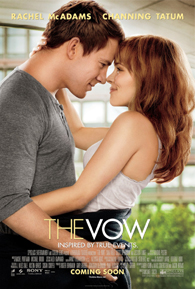
Here's the gimmick: following a car accident, the wife loses her memory of the last five years. She can't remember her marriage, her husband, dating or even meeting him, and she sure as hell can't remember the bunch of scary leftists who seem to treat her like they've known her forever. And here's the twist: five years ago, she was a spoilt princess scion of a wealthy family, a law major in love with and engaged to a slimy, albeit boring lawyer, and she's an omnivore to boot. Not only does poor Channing Tatum have to turn on his charm and woo his wife all over again, he has to date an essentially different woman who isn't at all attracted to him, his friends, or their way of life. But okay, she finds his humour mildly funny.
As a slightly more serious romcom, The Vow is not entirely predictable until it works its way to its happy ending. At times, Tatum infuriates with his dead-eyed delivery of clunky lines about romance and the meaning of life. He sounds like a male version of Bella from Twilight when he does that. Your consolation is when he flashes his naked posterior and torso at various points in this film.
In the late 50s and 60s, a French or Italian New Wave director (either Agnes Varda, Michelangelo Antonioni, or Federico Fellini) would have taken the same premise and most of the plot and worked it into a comic existential anti-romcom which celebrates how women are capable of radical self-refashioning, playing with society's perception of femininity, and leading a meaningful life despite flouting conventional expectations of a singular unified personality.
Perhaps The Vow is a sign that in this age, scriptwriting, directorial, and acting talent is just not sufficient for a romcom with an interesting premise to rise above itself. But as it stands, The Vow is an agreeable, slightly thought-provoking romcom.












 Printable Version
Printable Version










